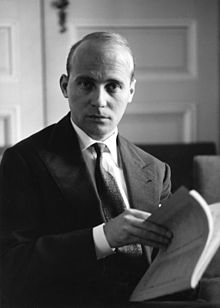| König Hirsch Il re cervo | |
|---|---|
| Opera by Hans Werner Henze | |
 The composer in 1960 | |
| Translation | The Stag King |
| Librettist | Heinz von Cramer |
| Language | German |
| Based on | Il re cervo by Carlo Gozzi |
| Premiere | 23 September 1956 Theater des Westens, Berlin |
König Hirsch (in English, The Stag King) is an opera in three acts by Hans Werner Henze to a German libretto by Heinz von Cramer after Il re cervo, a theatrical fable (1762) by Carlo Gozzi. He revised it as Il re cervo, premiered in 1963 at the Staatstheater Kassel.
Performance history[edit]
König Hirsch was first performed in a drastically shortened version by the Städtische Oper Berlin on 23 September 1956 in the Theater des Westens with staging by Jean-Pierre Ponnelle and conducted by Hermann Scherchen as a highlight of the Berliner Festwochen 1956.[1]
It was rewritten as Il re cervo, oder Die Irrfahrten der Wahrheit (The Stag King or The Odysseys of Truth) and performed at the Staatstheater Kassel on 10 March 1963. This version was also produced at the Santa Fe Opera on 4 August 1965. The complete, original form of König Hirsch was given for the first time on 5 May 1985 at the Staatsoper Stuttgart.
Roles[edit]
| Role | Voice type | Premiere cast, 23 September 1956[2] Conductor: Hermann Scherchen |
|---|---|---|
| The king (Leandro) | tenor | Sándor Kónya |
| The governor (Tartaglia) | bass-baritone | Leopold Clam |
| The maiden (Costanza) | soprano | Helga Pilarczyk |
| The preceptor | bass | Tomislav Neralic |
| Checco | tenor | Helmut Krebs |
| Coltellino | tenor | Martin Vantin |
| Scollatella I | soprano | Nora Jungwirth |
| Scollatella II | soprano | |
| Scollatella III | mezzo-soprano | |
| Scollatella IV | contralto | |
| Woman in black | contralto | |
| Statue I | soprano | |
| Statue II | soprano | |
| The stag | mime | |
| Voices in the forest, courtiers, animals, huntsmen, soldiers, city dwellers (chorus) | ||
Synopsis[edit]
The king, who has been cast into the forest as a child by the governor, returns to his kingdom. However he is tricked by the governor and forced to go back to the forest where he turns into a stag. Eventually he goes back once again, the governor is killed, and he is transformed again into human form.
Instrumentation[edit]
- Woodwinds: 3 flutes (3rd doubling on piccolo), 2 oboes, English horn, 2 clarinets, bass clarinet, 2 bassoons, contrabassoon
- Brass: 4 horns, 3 trumpets (3rd doubling on piccolo trumpet in C [ad lib.]), 2 trombones, tuba
- Percussion (7 players): triangle, tubular bells, suspended cymbals, pair of cymbals, tamtam, 3 tom-toms, tambourine, snare drum, military drum, bass drum (with or without cymbals), claves, maracas, legno, Gegenschlagstöcke, rumba bells, glockenspiel, xylophone
- Other: harp, piano, celesta, organ (ad lib.), harpsichord, accordion, guitar, mandolin
- On-stage band: flute, clarinet, 4 horns, 3 trumpets; percussion: triangle, small bells, tubular bells, suspended cymbals, pair of cymbals, tambourine, 2 snare drums, military drum, bass drum; glockenspiel, vibraphone, mandolin, celesta, organ, violin
Recordings[edit]
To date the opera has not been recorded in its entirety. An excerpt (act 3, scene 5) from a performance recorded by the Südwestrundfunk Stuttgart in 1985 (Julia Conwell, soprano; John Bröcheler, bass-baritone; Helmut Holzapfel, tenor-buffo; Würtembergisches Staatsorchester Stuttgart; Dennis Russell Davies, conductor) is included as part of:
- Neue Harmonien: Oper 1948–1962. CD recording, one disc. RCA Red Seal BMG Ariola Classics 74321 73539 2. Musik in Deutschland, 1950–2000: Musiktheater: Oper, Operette, Musical. [Germany]: BMG Ariola Classics, RCA Red Seal, Deutscher Musikrat, 2002.
References[edit]
- ^ Carl Georg Heise (27 September 1956). "Skandal um Henzes König Hirsch". Die Zeit (in German). Retrieved 28 January 2023.
'Liegt denn in alle dem ein Sinn?' sang getreu nach dem Libretto Heinz v. Cramers in schmelzenden Tönen der Tenor Helmut Krebs. 'Nee', hallte es vom dritten Rang wie ein Peitschenknall in die andächtige, vielleicht auch etwas schläfrige Festwochenpremiere. Das Parkett antwortete mit Beifall.
- ^ Casaglia, Gherardo (2005). "König Hirsch, 23 September 1956". L'Almanacco di Gherardo Casaglia (in Italian).